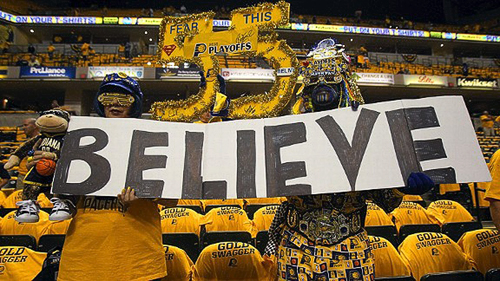I’m not ashamed to admit that whenever I play basketball, even if it’s just shooting hoops, I am pretending I am in the NBA. Pretty much everything that entertains us in the modern world is predicated upon the idea of imagination. In a lot of ways, personal taste just boils down to one’s ability to let go and be transported by something. The more fantasy (usually involving ourselves) we can invest in a given mode of entertainment, the more we respond to it.
Hoop dreams

I’m not ashamed to admit that whenever I play basketball, even if it’s just shooting hoops, I am pretending I am in the NBA.
Pretty much everything that entertains us in the modern world is predicated upon the idea of imagination. In a lot of ways, personal taste just boils down to one’s ability to let go and be transported by something. The more fantasy (usually involving ourselves) we can invest in a given mode of entertainment, the more we respond to it.
It’s easy to see this idea at work in something like Dungeons & Dragons, in which you are imagining yourself into a world of fantasy. But everything that entertains us operates on the same principle. Entertainment Tonight, UFC pay-per-views, poetry, NASCAR, the Oscar red carpet special, CSI, rock ’n’ roll, Lowrider Magazine, celebrity rehab, The Real World, Twitter—all that stuff is about pretending. It almost never feels like that, but that’s because the stuff we love absorbs us entirely, in extremely convincing ways.
Perhaps no form of entertainment is as effective in this regard as professional sports. They are by far the most interactive way to pretend. Even if you are just a “passive” fan, you no doubt subscribe to the notion of home field/court advantage, which is the idea that crowd noise and energy can alter the outcome of a contest. It is such a powerfully imagined insertion of ourselves into the game that it became real—fans willed it to life. The difference, of course, is that you can also literally play sports. I’m sure I’m not the first to make this observation, but a pickup game of basketball is the ultimate in live-action role-playing.
Which I think is completely healthy and also totally awesome. I’ve got a fantastic imagination, and I love basketball, so pickup games are pretty much Game 7 every time (except for the wheezing, wind-sucking and soaked T-shirts).
But I also believe that we are so invested in this fictional world that we forget that, for professional athletes, it is very real. I think those of us who are really absorbed by it have a tough time reconciling something fundamentally invented with its verifiable, flesh-and-blood counterpoint. We’ve got this wardrobe, and we’re stepping into NBA Narnia. We expect the amazing creatures we meet there to behave exactly like they do in the stories.
But those stories are inventions, just like our perceptions of pro athletes. They bear no more than accidental resemblance to the truth, and that’s where we get into trouble. We expect athletes to behave like we do when we pretend we’re in a Game 7. We want them to say interesting things and to revere the game in an almost mythical way. We expect them to have loyalty to a city and a franchise, to be good and uncommonly righteous people, to lift teams and communities onto their backs and carry them to greatness. We expect them to ruin their health for us and for the game, because that’s what we pretend we would do.
An athlete lives in a real world, though, and that world is defined by an entire lifetime of being the very best at one specific thing. It’s defined by a sense of competition so fierce that most of us wouldn’t understand it at all. Succeeding against this competition breeds a degree of ego and self-sustenance that would be totally unhealthy in our lives. The NBA makes the highly competitive and ego-driven world of finance seem ridiculous by comparison. There are thousands of businessmen and women in this country, but only about 360 elite pro basketball players in the entire world. It’s probably good that we turn them into characters—I doubt we’d recognize them as human otherwise.
What’s interesting to me is that the rest of us fans live in a real world, too. No one’s rooting for us; we are not the object of anyone else’s fantasy the way pro athletes are. We don’t do all of those things in our offices or classrooms that we expect athletes to do on the court. We don’t mythologize the part-time jobs we work to pay the rent, or think of interesting and insightful quips to describe the deeper meaning of the grande, no-whip iced mocha we just served.
But wouldn’t it be totally awesome if we did? If we could concentrate just a portion of the energy we devote to the fantasies that entertain us on imagining our own lives, think how invested in that fantasy we could become. I think that’s the greatest metaphor that sports (or music, or literature, or fashion or anything that inspires us to imagine) has to offer.
In our non-fantasy lives, we face almost constant pressure to be grounded, serious individuals. Why compensate by wasting all our efforts on inventing some sort of mythical pro athlete through whom we might live out our dreams vicariously? I’d rather try to make that world as close to my own as possible, often as possible. After all, it’s Game 7, and the clock is ticking.




